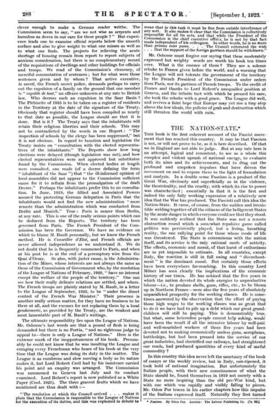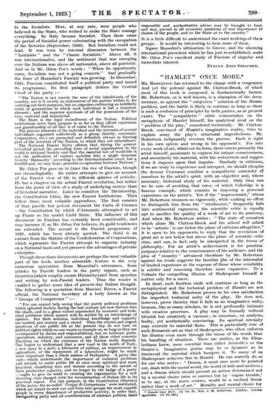THE NATION-STATE.*
Tins book is the first coherent account of the Fascist move ment that has reached this country. It may be that Fascism is not, or will not prove to be, as it is here described. Of that we in England are not able to judge. But at any rate here is an attempt, logical and consistent, to see as a whole this complex and violent uprush of national energy, to evaluate both its aims and its achievements, and to drag out the profound and unspoken impulses that have driven, the movement on and to expose them to the light of formulation and analysis. In a double sense Fascism is a product of the Great War, obviously and superficially so in the violence, the theatricality, and the cruelty, with which its rise to power was characterized ; essentially in that it is the first and indeed the only fully working expression of a relatively new idea that the War has produced. The Fascisti call this idea the Nation-State. It came, of course, from the sudden and irresis- tible welding together of all the citizens of the belligerent States by the acute danger in which everyone could see that they stood. It was suddenly realized that the State was not a remote abstraction round which a somewhat repulsive game called polities was persistently played, but' a living, breathing reality, the one rallying point for those whose mode of life was threatened. The State is coterminous with the nation itself, and its service is the only rational mode of activity. The effects, economic and moral, of that burst of enthusiasm are as yet impossible to estimate. In all countries, except Italy, the reaction is still in full swing and " disenchant- ment " is the dominant mood. But certainly those effects have been everywhere far-reaching. In this country Lord Milner has seen .clearly the implications of the economic history of our times. He has noticed that the five years in which the nation devoted its whole energies to unproductive labour—i.e., to produce shells, guns, rifles, etc., to be blown up in Northern France—were also the five years of absolutely unparalleled prosperity for the working classes. He is some- times answered by the observation that the effort of paying those high wages to the working' classes was so great that to do it we have had to pile up a debt which our great grand- children will still be paying. This is demonstrably true, but what, some heterodox people cannot help asking, would have been the result if all the intensive labour by well-paid and well-nourished workers of those five years had been devoted not to making economically useless guns, aeroplanes, battleships, but had been pressed into the service of our great industries, had electrified our railways, had straightened our roads, had produced quantities of every kind of Useful commodity ?
In this country this idea never left the sanctuary of the book of essays or the weekly review, but in Italy, sun-ripened, it took hold of national imagination. But unfortunately the Italian people, with their new consciousness of what the State should be, found themselves in 1919 not merely with a State no more inspiring than the old pre-War kind, but with one which was rapidly and visibly falling to pieces. Mr. Odon Por traces in his earlier chapters how this impulse of the Italians expressed itself. Naturally they first turned
• Fascism. y Odon Por. London : The Labour Publishing CO. [73.-64.1
to the Socialists. Here, at any rate, were people who believed in the State, who wished to make the State manage everything. So Italy became Socialist. Then there came the period of Socialist power culminating with the occupation of the factories (September, 1920). But Socialism could not lead. It was torn by internal dissension between the " Leninists " and the " Classic Socialists." Above all, it was internationalist, and the sentiment that was sweeping over the Italians was above all nationalist, above all patriotic. And so in Mr. Odon Por's words : "When its opportunity came, Socialism was not a going concern." And gradually the force of Mussolini's Fascisti was growing. In December, 1921, Fascism constituted itself a political party and issued its programme. - Its first paragraph defines the Central Creed of the party :—
" The Nation is not merely the suni of the inhabitants of the country, nor is it merely an instrument of the parties within it, for carrying out their purposes, but an organism embracing an indefinite series of generations in which each individual is but a transient element ; and the supreme synthesis of all the possessions of the race, material and immaterial.
The State is the legal embodiment of the Nation. Political institutions serve their purpose in so far as they afford expression and guardianship of all that is of value to the Nation. The private interests of the individual and the interests of several individuals organized collectively as a group (family, conimune, Corporation, etc.) are promoted and defended, always as forming part of the interests of the Nation, to which they are subordinate. The National Fascist Party affirms that during the present historical period the prevailing form of social organization in the world is national Society and that the essential law of world-life is not the unification of various societies into a single immense Slcicty 'Humanity' according to the Internationalist creed, but a fruitful and, we may hope, peaceful co-operation between Nations."
Mr. Odon Pot goes on to trace the rise of Fascism, though not chronologically. He rather attempts to give an account of the Fascist view of life in different spheres of activity. Ile has a chapter on the actual Fascist revolution, but rather from the point of view of a study of underlying motive than of historical narrative. Later he considers the Dictatorship, the Constitution Crisis, the new Fascist Institutions. Then follow three most valuable appendices. The first consists of that puerile but potent document the Carta di Camaro —the Constitution by which d'Annunzio attempted to set up Fiume as the model Guild State. The influence of this document on Fascism has certainly been considerable, and may increase if, as Mr. Odon Por believes, its guild tendencies arc extended. The second is the Fascist programme of 1921, which has been already quoted. The third is an extract from the Statute of the Confederation of Corporations, which represents the Fascist attempt to organize industry on a National basis and yet preserve the advantages of private enterprise.
Though these three documents arc perhaps the most valuable part of the book, another admirable feature is the very numerous quotations from Mussolini's utterances, from
articles by Fascist leaders in the party organs, such as Gerarchia (which roughly means Hierarchy)and from speeches
and writing by non-Fascist leaders. Thus the reader is enabled to gather some idea of present-day Italian thought. The following is a quotation from Massimi Rocca, a Fascist official, the National Secretary of a body known as the "Groups of Competence" :—
" For one cannot help seeing that the purely political problems which agitated Society during the last century are now thrown into the shade, and to a great extent superseded beconomic and tech- nical problems which cannot well be settled an interchange of opinion. For their solution, individual know edge and capacity arc needed, not oratory and a crowd. Thus the crucial and urgent questions of our public life at the present day do not turn on political rights which no one wants to trample on, so long as they are accompanied by duties and responsibilities, but on railways, ports, agriculture, industry, and commerce, and all those other concrete functions on which the existence of the Nation really depends. One begins to understand that a new road in the south of Italy, a new quay in a port, a kilometre of railway, an improvement in agriculture, or the equipment of a laboratory, might be much more important than a whole session of Parliament. A party like ours—which understands the importance of technical problems and intends to make public life at once more spiritual and more practical, classifying men and women according to the nature of —ought to give its mind to creating the organization for a new their productivecapacity, and no longer by the badge of a party directing class charged with the reconstruction of Italian life in its practical aspect. For this purpose, in the Constitution (Statuto) of the party, the so-called ' Cnippi di Competenza ' were instituted, which are meant to seek out and form into groups the most capable people in every department of productive activity, in order that, disregarding party and all considerations of abstract polities, their
•
responsible and authoritative advice may be brought to bear, and may prevail in all economic questions of real importance to classes of the people, and to the State or to the country."
It is a little difficult to understand the exact workings of these groups. It would be interesting to hear more of them.
Signor Mussolini's ultimatum to Greece, and the alarming international precedent which he has just re-established, make Mr. Odon Por's excellent study of Fascism of singular and immediate interest.
EVELYN JOON STRACIIEY,



































 Previous page
Previous page